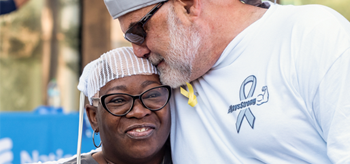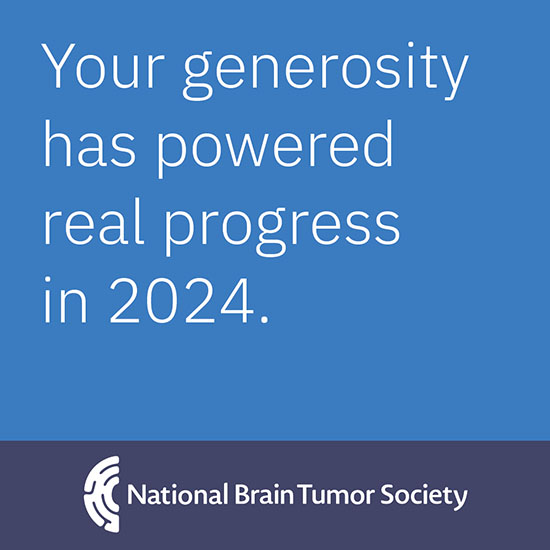For everyone living with a brain tumor diagnosis, it’s time for a better chance. Patients and their loved ones look to the National Brain Tumor Society (NBTS) to fuel the breakthroughs ahead that will give everyone with a brain tumor a better chance — a better chance at survival, improved quality of life, and finding community.
Through the generosity of our community, volunteers, advocates, and philanthropic partners, NBTS is working tirelessly to drive discoveries forward, provide support to patients and care partners, and ensure the needs of this community are heard at the highest levels.
From funding best-in-class research to championing vital legislation in Congress to helping the newly diagnosed navigate their personal brain tumor experience, your generosity has powered real progress in 2024. In this report, we celebrate these achievements as we look ahead, with gratitude, to all we can accomplish together to conquer and cure brain tumors — once and for all.
Defeat
NBTS drives and influences best-in-class medical research to develop and deliver longer survival, better quality of life, and ultimately cures through new innovative treatments for patients with brain tumors as quickly as possible.
The U.S. Food and Drug Administration (FDA) approved vorasidenib for the treatment of adult and pediatric patients 12 years of age and older with grade 2 astrocytoma or oligodendroglioma with an IDH1 or IDH2 mutation. This development marks the first FDA approval of a systemic therapy for patients with these low-grade gliomas.
NBTS played multiple roles in advancing this discovery, including funding Memorial Sloan Kettering Cancer Center-supported laboratory work that helped propel this research from a phase II to a phase III trial.
“The close collaboration between patients, clinicians, advocacy groups, and Servier has helped to propel the advancement of vorasidenib throughout the clinical development process. NBTS’s support for research, its convening role in bringing people together, and shared vision of patient centricity has been integral in the efforts to bring vorasidenib from bench to bedside.”
— Islam Hassan, MD, Senior Medical Director, Vorasidenib Clinical Lead, Cancer Metabolism – LS/LCM, Servier Bio-innovation
Drs. Priscilla Brastianos at Mass General Cancer Center (MGH) and Rachel Vaubel at the Mayo Clinic are working together to explore novel treatments for meningiomas in research models with the goal of rapid translation to the clinic. The team is validating a novel combination of drugs targeting common mutations in meningiomas, which is the most common type of primary brain tumor. This drug combination has shown decreased tumor growth in laboratory models of meningioma. Pending positive results from this study, plans are in place for rapid translation of this combination into the clinic in partnership with the Alliance for Clinical Trials in Oncology.
As part of NBTS’s DNA Damage Response Consortium collaboration, Dr. Jann Sarkaria (Mayo Clinic), Dr. William Elmquist (University of Minnesota), and the pediatric research group at St. Jude Children’s Research Hospital (Drs. Anang Shelat, Chris Tinkle, and Stephen Mack) are testing a DNA damage response inhibitor called WSD-0628. The drug is currently being evaluated in a phase I clinical trial in adults with recurrent glioblastoma at Mayo Clinic. The research teams are performing laboratory experiments to inform optimal dosages of both WSD-0628 and radiation when these two treatments are combined. Since WSD-0628 greatly enhances the effects of radiation, this may significantly improve survival and quality of life for patients. These studies will help guide the development of additional clinical studies in adults with glioblastoma and a phase I clinical trial in children with pediatric high-grade glioma, including diffuse midline glioma (DMG) and diffuse intrinsic pontine glioma (DIPG).
NBTS-funded research at St. Jude Children’s Research Hospital uncovered a new way that ependymoma tumors develop and grow, which could lead to a new class of drugs that target these processes. Stephen Mack, PhD, and his team discovered that serotonin, a signaling chemical in the brain usually associated with mood and brain function, can attach to proteins called histones that are coupled to DNA. This process alters the way certain genes are turned on or off, which can influence ependymoma development and growth. This study, published in Nature, helps researchers better understand how brain cells communicate with ependymoma tumor cells.
NBTS’s Brain Tumor Investment Fund® (BTIF) first invested in Modifi Biosciences in 2021 and subsequently invested three more times since. Their novel drug designed for glioblastoma has the potential to more effectively treat MGMT-deficient glioblastoma without developing resistance to the drug, which is a concern with the current standard of care treatment, temozolomide. In 2024, oncology powerhouse Merck acquired Modifi Bio. This exit of a portfolio company brings revenue back to BTIF, which can then be invested in additional promising start-ups in the brain tumor space. Not only does this acquisition validate NBTS’s investment in promising research, but it also demonstrates the role that venture philanthropy can make to invest in early-stage start-ups in the brain tumor space that is important to advance promising treatments for patients with brain tumors.
Connect
NBTS convenes, educates, and unites the brain tumor community.
While guidelines highlight the importance of biomarker testing (WHO) and clinical trial participation (NCCN) in the care of patients with brain tumors, a recent NBTS-organized community survey demonstrated many patients do not understand these critical topics. With that in mind, NBTS launched the MyTumorID campaign in 2024 to empower patients to identify their tumors through biomarker testing and know their options, including clinical trials, to make informed decisions about their treatment.
This fall, NBTS held its inaugural meeting for Caregiver Support Conversations, where care partners can talk virtually about the feelings and emotions accompanying any aspect of the brain tumor experience in a welcoming space. Volunteer co-facilitators Liz Piña and Kelly Theberge host this monthly support group for caregivers currently supporting a person living with a brain tumor to connect on topics that matter to them.
NBTS brought together thousands of members of the brain tumor community at NBTS-hosted and volunteer-driven events in nearly all 50 states, D.C., and now internationally, including the inaugural Wisconsin Brain Tumor Walk & Race, NBTS’s first Gray Nation Endurance® team at the Philadelphia Marathon, and a new fundraiser in Canada.
Liquid biopsy has the potential to advance the field of neuro-oncology therapy development as an additional tool for clinicians, researchers, regulators, and patients. In 2024, NBTS’s Research Roundtable program brought stakeholders together to discuss the prospects for the use of liquid biopsy in neuro-oncology and develop a plan for further action.
Change
NBTS fuels the voice and power of the brain tumor community to advocate, elevate our mission, and influence public policy.
The BRAIN Act (H.R.9113/S.4739) was introduced in Congress in July 2024 to strengthen research efforts, accelerate the quest for cures, improve access to cutting-edge treatments, and innovate the way health care is delivered for patients with brain tumors and survivors. This bipartisan and bicameral piece of legislation – a historic first for the brain tumor community – advances the quest to defeat brain tumors, once and for all, by increasing research funding, fostering collaboration, promoting critical awareness initiatives, and supporting innovations in and access to care. NBTS led advocacy efforts urging members of Congress to co-sponsor this bill at the 2024 Head to the Hill and Advocate From Your State events.
Thanks to the collaborative advocacy efforts of NBTS within the brain tumor community, National Institutes of Health (NIH) funding for brain tumor research saw a considerable increase of approximately $6 million. Additionally, Congress created a new glioblastoma-specific funding stream for the first time and dedicated $10 million to peer-reviewed glioblastoma (GBM) research in 2024 within the Congressionally Directed Medical Research Program (CDMRP).
Children and adolescents with complex diseases like brain tumors often require specialized care that isn’t available to them locally. This fall, the House passed the bipartisan Accelerating Kids’ Access to Care Act (AKACA), which would ease the bureaucratic red tape for pediatric patients with complex medical conditions to receive specialized care out of state. NBTS continues to advocate alongside other pediatric organizations for the passing of this bill in the Senate with the hopes that it will be signed before the end of the year.



